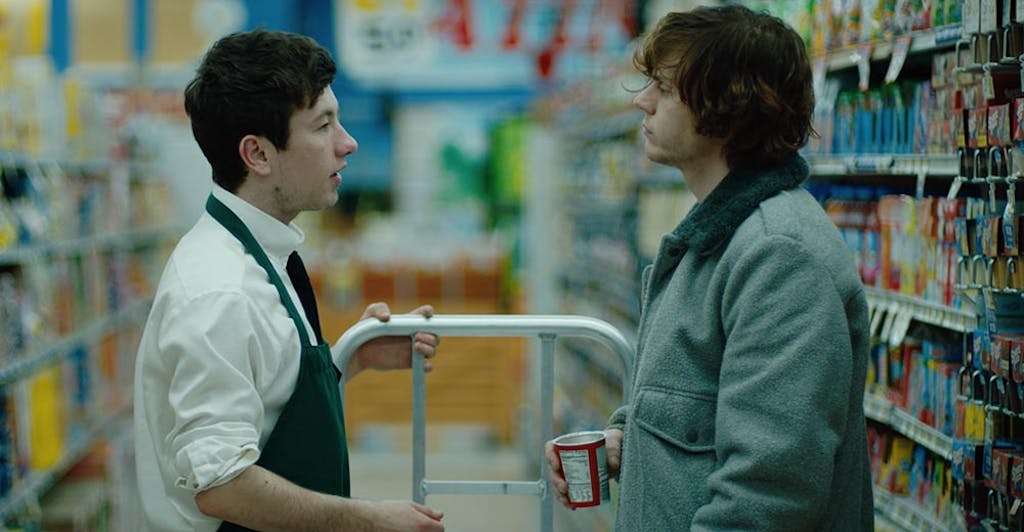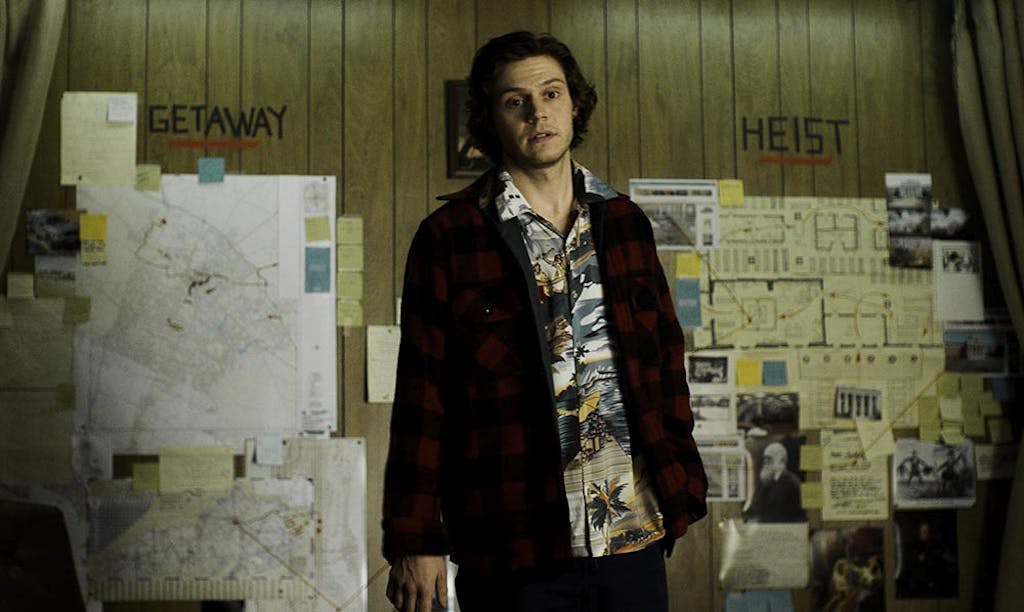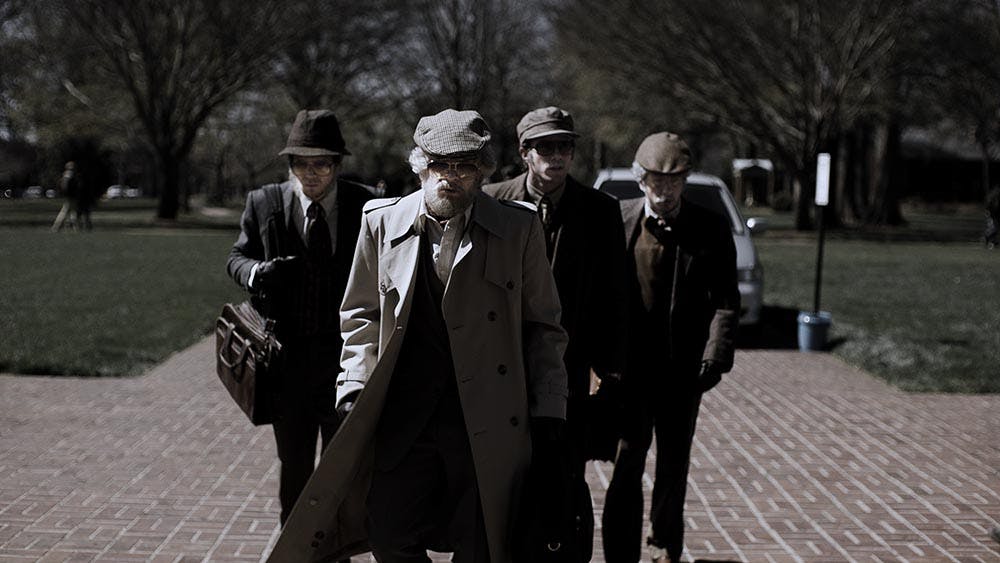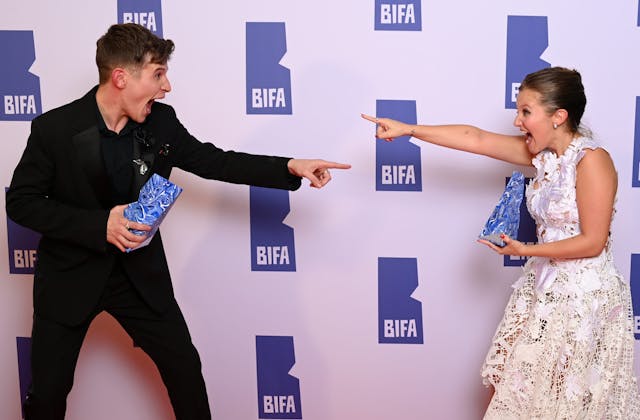By Damon Wise
Bart Layton first crossed BIFA’s radar with The Imposter in 2012, the eye-popping story of Frédéric Bourdin, a French conman with stubble and a heavy accent who posed as missing Texan teenager nearly ten years his junior. The deception was strange enough, but what happened when the boy’s family decided to embrace this interloper is what propelled Layton’s film from being just a quirky crime story into a shocking American Gothic murder mystery. A similar leap occurs in the follow-up, American Animals, which, with 11 BIFA nominations, is the second most nominated film of the night.
Once again, it’s based on a strange-but-true story: the Transy Book Heist, masterminded by one Warren Lipka (played by Evan Peters), which took place in December of 2004. In principle, it wasn’t supposed to a robbery so much as a daring daylight snatch, with four seemingly ordinary high-school jocks teaming up to swipe millions of dollars’ worth of valuable anthropological and ornithological first editions from the rare book room at Kentucky’s Transylvania University. Unfortunately, as Layton’s film shows in nail-biting detail, real life stepped in the way, and what begins as a light-hearted caper becomes a nightmare as the plan becomes reality – the campus’s mild-mannered librarian, Betty Jean Gooch (The Handmaid’s Tale’s Ann Dowd), is Tasered, bound and gagged, crossing a line that can never be uncrossed.
As in The Imposter, Layton plays with fact and dramatization throughout, recreating the four boys’ movements while at the same time inviting each of them to tell their stories from their personal perspective. The result is a terrific, troubling hybrid: a thriller that critiques itself before your very eyes, hitting all the required high-octane genre beats while at the same time questioning the boys’ – and our – motives and morality.
There was nothing else quite like it in 2018…
How do you feel about being nominated for 11 BIFAs?
Aside for being a killer night out, the BIFAs feel like an important moment of recognition for the kind of work that only British cinema does. Even though American Animals is an American story, set in the States with a largely American cast, for me it always felt like a British film seen through a British lens. The truth is, it was an experimental movie that was attempting to do something different, and ultimately it was the Brits who were willing to put their money where their mouths are in order to let me go do it – I’m not sure would ever have happened in the US. Last time I was at the BIFAs I won for Best Documentary and Best Newcomer [for The Imposter], and I remember thinking, “Shit, I really hope I manage to do something else half-decent in the future” so getting 11 nominations for this one feels amazing – and I guess is some endorsement that the experiment must have paid off on some level.
Where did you first hear about the Transy Book Heist?
I read about it in a magazine on a transatlantic flight. I was possibly on my way back from Sundance, after The Imposter. I was leafing through a magazine, and I found this story, and I thought it sounded intriguing. It wasn’t one of those things where you think, “I absolutely have to tell this story,” it was just a really cracking caper story, but also there were quite a lot of unanswered questions – mostly to do with the idea of a group of young, privileged white guys with plenty of opportunity who would decide to squander all of that on a plan that was so obviously likely to fail. That part of it was intriguing – the ‘why’ of it – and that led me to get in touch with them in prison. It was the letters, really, more than anything else, that we began to exchange that took it from being a fun yarn into something that felt like quite a deeply resonant and relevant story.
How did you refine those elements into the script?
I guess it all came from this thought that there might be a way of telling the story, and structuring the film, that mirrored the descent into fantasy world for these young guys. They fell in love with a movie fantasy and allowed it to go way too far. And I thought, “Well, wouldn’t it be fun if, somehow, the audience were to become complicit in that as well?” In that way, the structure is very much one of inviting the audience in – we start in a place of relative naturalism, and as the guys get more involved and invested in the plotting and the planning and all of that, so the grammar of the film starts to change a bit. The music, the colour palette, the camera movements – all of it edges a little closer towards movie world. And I guess the big thing for me, which was critical to me wanting to tell the story, was the third act, after they – almost inadvertently – cross a line. The fantasy is allowed to go way past the point where it should have stopped. They are so detached from reality that when they cross the line they are suddenly thrust headlong back into it. That very much felt to me like the most important part – crashing back into something that feels almost uncomfortably real.
Did you ever think about doing it as a straight fiction film?
Actually, I didn’t, because I felt that, as a straight fiction film, you would lose the thing that, I suppose, makes it jaw-dropping, which is that they’re not professional criminals. It’s a fantasy that goes too far, and if you were just in movie world, I think you’d lose the visceral reaction that audiences seem to have, where they’re constantly asking themselves, “Where the fuck is this going to end?” “How far is this going to go?” and “What’s going to happen?” And that’s precisely because they’re not just off in a kind of movie world, where they don’t really have skin in the game. Now, obviously, with American Animals, we don’t literally have skin in the game, because we’re not them. But I think people do engage with it in a slightly different way, because they’re being asked to connect with the real guys. And I think if you did fictionalise it, you’d probably be suspicious – you’d think, “Well, the director just made them out to be middle-class guys who weren’t really criminally minded.” But when you get to see them, and you look them in the eye, you get to see what a documentary can really do, which is absolutely riveting. Because you know it’s a true story.

Did you learn anything about mixing documentary and dramatization from The Imposter?
Audiences are very smart, and they’re totally capable of understanding how that interplay can work. For example, we’ll watch a well-known true story and we’ll know very well that Natalie Portman is not Jackie Kennedy, but we’ll happily go along with it. We’ll sign up and we’ll suspend our disbelief. But for this, I wanted people NOT to suspend their disbelief. I wanted them to be constantly in total belief of what they were seeing. I think the risk you take with that is that you might end up diluting one or other element. But my feeling was that you could actually do the opposite – it becomes greater than the sum of its parts, because you are brought into the movie, and brought into the process, in a way that forces you to connect with the story and the characters in a much deeper way.
Did you have any worries about what you were getting into with these four guys?
With documentary, if you’re going to ask people to bare their souls, you do have to give something of yourself – you have to be honest about what your intentions are. I didn’t think they were sociopaths. I thought they were deeply misguided young men who had been really lost and then had let a bad idea go too far. I never felt any concern about who I was getting involved with. But I was also pretty straight with them. They knew they weren’t going to come out looking like heroes, but they didn’t really expect that – and they didn’t want that either. You just have to be really open, and you do have to be honest about your reasons for wanting to tell the story and not try and pull the wool over anyone’s eyes.
How much did you involve them in the process?
I didn’t let them see the script, and I didn’t let them see a cut before it was finished. But I certainly had to win their trust, and then once they’d made that decision, I suppose, yes, they were taking a risk with their story and their portrayal. But I also think that, at that point, they knew where I was coming from, well enough to know that I wasn’t going to do anything wildly different from what I’d said I’d do. It was different with Betty Jean, the librarian. She’s the victim, and if she’d hated the film – and I did show her the film before it was finished – and if she’d had issues with it or felt it misrepresented things, that would have been different. I would have definitely wanted to change it until she was OK with it.
And was she OK with it?
Not only was she OK with it, she really enjoyed it, and at the end she said that she felt it had given her the ability to move on and start to forgive.

Is it true that you forbade Evan to contact the real Warren?
Yeah.
And he didn’t listen to you?
No, Evan didn’t like that. He understood that I was trying to protect him from stuff that would limit him in terms of his performance and also finding his connection with the character. But he was also, like, “Well, there’s this real person and I’m going to be playing him. So why wouldn’t I be able to hang out with him?” But my point was Warren is now at least 10, 12 years older, and for most of that time he’d been in prison, so he was now a totally different person. It would be like hanging out with me now to try and understand what I was like at 20. I’m not sure that it would be very helpful.
How did you prepare the cast for the roles?
I gave them excerpts from the interviews that I’d shot. I gave them footage that was both in the film and not in the film, and things that related to different scenes that were in the film that I thought would help increase their understanding of the guys’ motivations. At one point I sent Evan the FBI file and the transcript from Warren’s post-arrest interview. Things like that – where there was a real immediacy to it – was much interesting to me than the stuff where there’d been time for lots of post-rationalisation. I’d done so, so much research, and my feeling was that I had that distilled the majority of what needed distilling into the script, and that they actors should handle it and approach it just the same as they would any script that they might get, whether it was true or not. If there were things that they were struggling with, we would discuss it, but most of it, I felt, was on the page by the time I’d finished the script,
There are a lot of references and in-jokes in the film. Were they scripted too?
A few things were planned. There were specific references to the kinds of movies that they were inspired by. Also, one of the boys, Eric, in a letter from prison, talked about the whole kind of adventure being a bit like their version of Fight Club – Fight Club, the book, had been a big influence on him, as was the book that was the basis of the Into The Wild movie. And so there were references there. But mostly they were watching all these movies in order to plan the caper, and because it’s a movie, in part, about falling into a movie, I felt that we should use some of that. In fact, we had a saying on set: in their minds it was Ocean’s 11, but in reality it was Dog Day Afternoon.
What about the disguises they wear for the heist itself?
I was thinking about the costumes that Robert Shaw and his gang wear in The Taking Of Pelham 123, and I thought that if these guys were going to dress up as old men, they were probably going to go and raid their grandfather’s closets. So there was a whole ’70s quality to that. There was even a ’70s quality to the library itself. I guess I liked the idea of kind of paying homage to some of those great 70s caper movies, which are among my favourites.
There are also lots of references to birds and wildlife. Was that in the script as well?
Very much so. I mean, I think it got to a point where I was probably over-labouring it – this whole theme about Darwin and evolution, and this idea that they were searching for an experience beyond their safe existence. I mean, if you come from the environment that they come from, you’re not faced with survival in the Darwinian sense. The things that you’re worrying about are things like, “Am I going to be famous?” “Am I going to be important?” Not, “Am I going to have food and shelter?” So I felt that part of what was motivating their whole behaviour was to do with this kind of this idea. There was a great quote from Darwin where he talked about domesticated animals. He said that the reason that most dogs that we own as pets have drooping ears is because, over the centuries, they’ve realised that they don’t need to be alert any more, whereas if you look at wild animals, like foxes and wolves, you still see that kind of alertness. And that seemed to be a very interesting comparison to me – in a way, these guys are the domesticated animals. They’re searching for an experience that is going to make them feel alive, and that’s going to make them feel like they have some purpose and meaning.
What was their reaction when you showed them the film? Did they all see it at the same time?
I showed it to them individually, before we premiered at Sundance. I felt that they should at least see it before the rest of the world saw it – not with a view to changing anything if they didn’t like it, but just so that, if they hated it, they might choose to not come to Sundance. There was a lot of stuff in the movie that they were deeply ashamed of, but they all said it was pretty accurate. They all thought it was really, incredibly true to their memories and their experience.
What are you doing next?
I’m just in the process of finishing a script, which I’ve been working on with Peter Straughan, a brilliant, brilliant writer, and it’s an adaptation of a book, but it’s not true story – I feel like I’ve got that kind of hybrid thing out of my system for the moment. It’s just sort of darkly comic thriller, with a very Trumpian overtone to it. I’m always looking for stories that are ripping yarns, but, more than that, offer an entry point to a way into an interesting conversation about something much, much bigger.



